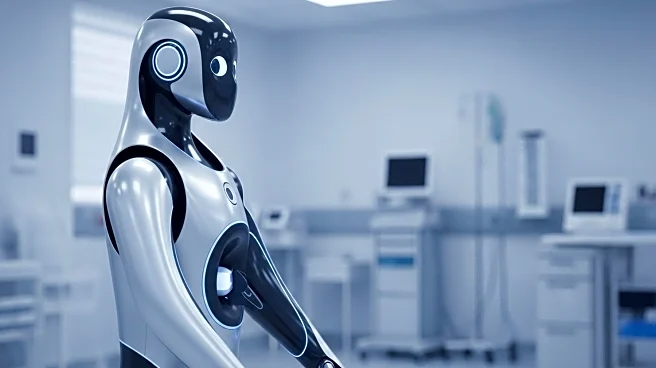What's Happening?
Expper Technologies has developed an AI-powered therapeutic robot named Robin, designed to act like a 7-year-old girl, to provide emotional support in nursing homes and hospital pediatric units. Robin has been deployed in 30 healthcare facilities across California, Massachusetts, New York, and Indiana. The robot aims to alleviate staffing shortages by engaging with patients, offering companionship, and performing tasks such as playing games and remembering personal details like names and favorite songs. Robin is about 30% autonomous, with remote operators controlling the rest of its functions under clinical supervision. The robot's design includes a sleek white frame intended for hugging, and it mirrors the emotions of the person it interacts with, providing a personalized experience.
Why It's Important?
The introduction of Robin into healthcare settings highlights the growing role of artificial intelligence in medical care, particularly in addressing emotional and social needs of patients. With the U.S. facing a projected shortage of up to 86,000 physicians in the next 11 years, Robin offers a solution to fill gaps in patient engagement and support. This development could lead to improved patient experiences, especially for children and the elderly, by providing consistent emotional support and companionship. However, it also raises questions about the impact of AI on traditional patient care and the potential for robots to take on more responsibilities in healthcare delivery.
What's Next?
Expper Technologies plans to enhance Robin's capabilities by enabling it to measure patients' vitals and assist elderly patients with daily activities such as changing clothes and using the bathroom. The company aims to make Robin an even more integral part of care delivery, not as a replacement for healthcare workers, but as a complement to existing services. As Robin's functionality expands, it may become a model for similar AI applications in healthcare, prompting discussions among stakeholders about the ethical and practical implications of AI in patient care.
Beyond the Headlines
Robin's deployment in healthcare facilities also touches on broader ethical considerations regarding the use of AI in sensitive environments. The robot's ability to collect data while complying with privacy regulations like HIPAA suggests a careful balance between technological advancement and patient confidentiality. Additionally, Robin's development reflects a shift towards user-driven design, as its personality and responses have been shaped by interactions with patients, emphasizing the importance of human-centered AI development.











